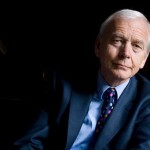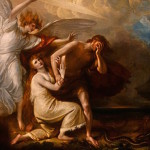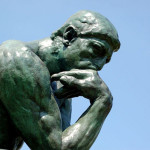Atheism, Prot-Enlight, and the Schizophrenic Republic
by Timothy Gordon
Filed under Atheism, Natural Law

Last week, I wrote about the longstanding Catholic drive to reinterpret the philosophy of Plato as realist. In actuality, Aristotle’s philosophy perfected Plato’s by connecting the material to the formal world—two separated domains which, in Plato, remain wholly alien to one another. Accordingly, it is quite a “stretcher,” I suggested, when Catholics talk about Plato as a realist. Any philosophy which divorces the material and the formal qualifies as anti-realism, because matter’s interaction with form is the very thing that constitutes intelligibility. (More on that below…)
As predicted, the article’s “combox” bore out my very thesis: Catholics and other Westerners (including some atheists) remain so strongly accustomed to just such an unduly charitable characterization of Plato that they startle to hear otherwise.
But here’s the real rub: such a distinction between the two ancient philosophers matters only because we live in a more violently anti-realist Modern era, which put to death (in popular thought) the Natural Law of Aristotle and of the Church’s Scholastic philosophy. Plato’s errors would not matter nearly so much if we were pre-Moderns.
As mentioned in last week’s article, living in the “Modern era” means inhabiting the centuries after the Sixteenth. Two moments of that most unfortunate century are directly insinuated here: the Protestant Reformation and the secularist Enlightenment. They are equal but opposite rejections of the Natural Law.
Today, in English-speaking countries, the faithful grandchildren of the Reformation are usually thought of as “the religious right,” while the intellectual progeny of the Enlightenment comprise “the secular left.” It so happens, as one of history’s bitterest ironies, that in countries like America and England, a giant, sustained food fight erupted between the two sets of grandchildren...who were once fellow travelers! We are all familiar with these skirmishes, of course, comprising the so-called “culture war” between two shouting, red-faced fundamentalisms: Protestant Biblicism versus Enlightenment Scientism in all its many vestiges.
The narrative not falsely goes that these two camps despise one another.
They do…today. But as aforementioned, it was not always so. One is surprised to find that together, each half of Prot-Enlight originally teamed up with the other against the Natural Law of Aristotle and of the Catholic Church. Together, each camp strove cooperatively to make the sixteenth century Catholic view of nature, the Natural Law, seem outdated. Together, both parties asserted an aggressive new anti-realist dichotomy for the supposedly new times: form versus matter, faith versus science, even faith versus reason.
Ironically, the two sides cooperated steadily against the Church during the sixteenth, seventeenth, and eighteenth centuries in order to create these false dichotomies, only to spend the nineteenth, twentieth, and twenty-first centuries arguing ceaselessly about them!
Whether or not the reader accepts Plato’s role in this Modernist overturn of the Natural Law, it is far more important—and leagues more undeniable—to a clear conception of our world that we come to terms with the primary role played by Prot-Enlight. Plato’s role was mere prefigurement to that of the Prot-Enlight philosophies. The Prot-Enlight philosophies set the goal as the complete eradication of the Natural Law.
Prot-Enlight and the Three Prongs of the Natural Law
The two halves of Prot-Enlight Modernism altered the prevailing Western notion not so much of God, counterintuitively, as of nature. That is, any pop-theological changes wrought by the Reformation or the Enlightenment were actually secondary, in pervasiveness, to the harmful amendments Prot-Enlight made to the popular Western view of the world, or reality, itself.
I wrote in last week’s article: “In the main, Aristotelianism stands for reality’s incipient freedom and morality, its intelligibility, and its teleology.” Whether we’re talking about the authors of the Enlightenment like Francis Bacon and David Hume or the authors of the Reformation like Martin Luther and John Calvin, Prot-Enlight sought to “take down” the “big game” of the Catholic Natural Law, of which these three prongs were (and are) constitutive.
Natural Law Prong #1: Firstly, Catholic Aristotelianism (i.e. Thomism) puts forward physical nature as the forum of man’s freedom and morality. In other words, humanity’s freedom and morality are altogether natural. Catholicism does not naively suppose that either human or physical nature guarantee man’s automatic morality through any and all uses of his freedom; rather, physical nature is the forum where the proper use of human intellect and will may through deliberate action dispose each of the natural appetites, through habit, toward morality. And nature is the locus in quo where this happens. The secular and the Protestant worlds together decry this Catholic position: morality, for each worldview, counteracts nature. Again, for Catholicism, morality is perfectly natural, which is why Thomas Aquinas asserted that all of the appetites are natural…if implemented with the proper disposition, of course.
Protestantism, as mentioned above, rejects the possibility of freedom and morality altogether. Man is enslaved to sin. Whether we talk of Luther’s assertion that human will is “in bondage,” or Calvin’s infamous doctrine of predestination, Protestantism writ large rejects the first prong of the Natural Law hailed by the Catholic Church. The Protestant view of sin, mankind’s “total depravity,” swallows up any possible proper usage of intellect or will.
The Enlightenment, on the other hand, posited naturalism—the perfect opposite of the Natural Law’s first prong. Naturalism describes a deterministic nature which we find “red in tooth and claw.” The animals are no more than complex mechanisms, meat machines, which operate as the vector sum of their competing appetites. Moreover, naturalism places man squarely in the middle of, not above, nature. He too is bestial. He too is determined by his appetites alone. He too is just a meat machine. As such, human free will is rejected and determinism (equal but opposite to Protestant pre-determinism) prevails, although Enlightenment thinkers certainly wouldn’t designate this “sin,” as the Protestants do.
Natural Law Prong #2: Secondly, Catholic Aristotelianism puts forward nature as intelligible. “Being is intelligible,” Aristotle famously explained. As articulated in last week’s article, Aristotle described that form was in matter, as it were, rather than above matter, as Plato had taught. Because matter is in-formed, then, nature is intelligible. If form were instead compartmentalized somewhere above matter, as in Plato’s “noetic heaven,” then the material objects would be neither knowable nor differentiable. But the opposite is true. On this Aristotelian basis, the Thomism of the Catholic Church affirms that faith and reason work together, rather than against one another. Faith is strengthened, not weakened, by the two ways of knowing about human reality: the a priori way, philosophy, and the a posteriori way, science. Both philosophy and science affirm theology because, as Thomas Aquinas famously held, “truth cannot contradict truth.”
Protestantism, beginning with Luther, repudiated the scientific worldview—and not only the false scientific worldview of Scientism, but even science properly done. Protestantism also rejected the philosophical approach to the world: Luther held that “the whole of Aristotle is to theology as shadow is to light.” The rallying cry of Luther’s Reformation was sola scriptura, meaning that the Bible alone—not science or philosophy or anything less than supernatural revelation—is intelligible to the mind of man.
The teachings of the Enlightenment, in a coordinate if opposite manner, reject the intelligibility of the universe. And this is strange because Enlightenment secularists have always claimed to be “for science,” a claim which requires the principle of intelligibility. It’s quite simple: the new Scientism posits materialism. For the materialist, nothing but matters exists. Even though this precludes both ratio and intellectus, materialists never seem to understand how their point of view vitiates science’s ability to be done at all (cogitation requires ratio and intellectus: one recalls John Lennox’s debate with Richard Dawkins, where clearly Dawkins failed to understand Lennox that “the principle of consciousness, intelligibility itself, proved [his] point”).
Natural Law Prong #3: Thirdly, the Aristotelian view of nature poses nature’s goal-orientedness (i.e. teleology). Nature discloses its own purpose. Just as in prong #2, wherein the Catholic worldview affirms via the principle of intelligibility the formal cause of nature, this third prong of the Natural Law affirms nature's final cause as Jesus Christ. Nature's purposive, christological aspect is the culmination of Natural Law prongs one and two: because nature has a goal, its morality and intelligibility are thereby validly connected to the supernatural. If, in fact, nature were devoid of a supernatural telos, as the Prot-Enlights believe, then its ostensible morality and intelligibility would be rendered arbitrary and even conceptually null.
So, with regard to the convoluted Protestant stance on prong #3, the Reformation rejection was not of Christ, but of his sustained connection to the physical world. Reformation theology rejects the idea that nature's purpose is knowable through human examinations of the world. In short, Protestants express ambivalence insofar as they think the natural world does not really have a knowable supernatural end, even though of course they affirm Christ as the Logos (and in that sense, the goal). As Louis Bouyer said, “in Protestantism, everything goes on, or seems to go on, as if the Incarnation had ended with the Ascension of the Savior.” As if Jesus' connection to the world lasted only thirty-three years!
Clearly, through the Enlightenment’s rejections of God, of formal causation, and even of consciousness itself, the secularists removed any conception of a purpose in the universe. Such a crystal clear issue need not be belabored here. The secularists tell us every day, after all, that everything is pointless.
Conclusion
From here, the story only gets stranger and stranger. After all, the Modern English-speaking republics—Canada, New Zealand, Australia, South Africa, among ours and the motherland—all claim to be founded upon the Natural Law, even as their professed basis lies in the twin sixteenth century movements (their opposite motives notwithstanding) whose raison d’etre was the elimination thereof!
So where does that leave us?
It leaves us confused, schizophrenic. Think of American history: who was it but men steeped in the Reformation and the Enlightenment—the “Prots” and the “Enlights”—who drafted the several state constitutions, the Virginia Declaration of Rights, the Declaration of Independence, the Constitution, and the Bill of Rights? And what are these papers but documented ways of life, memorialized articles of culture, predicated squarely upon the Natural Law. As such, we Moderns are confounded citizens of the most schizophrenic republics of all-time. America, crown gem of all the paradoxical republics, was even founded as against Rome, by folks who thought Canterbury had grown to be too close a likeness.
Americans in 2016 have the temerity to be surprised when recounting our cultural failures in Natural Law living. Many Americans even have the gall to wonder why our republic is failing. In short, when Modernism is based upon dual rivaling rejections of the Natural Law, untangling the web equates to no trifling academic affair: it becomes an existential exercise required for our very survival. Until the republics founded in the Modern era return to the Natural Law, we will continue to be unable to justify such republican desiderata and sine qua nons as: natural rights, subsidiarity, popular morality, anthropology, a liberty-based political economy, and a humane employment of science and technology (materialist science yields materialistic technology, as we recognize). We shall no longer receive these benefits without shouldering the burdens, or at the very least without acknowledging the mutual exclusivity of the Natural Law and Prot-Enlight Modernism.
Until we return to Aristotle, to Thomas, and to the Natural Law, we should expect to find our Modern world more than just cold and hostile to us—we should expect to find it unfree, unintelligible, and pointless.
Related Posts
Note: Our goal is to cultivate serious and respectful dialogue. While it's OK to disagree—even encouraged!—any snarky, offensive, or off-topic comments will be deleted. Before commenting please read the Commenting Rules and Tips. If you're having trouble commenting, read the Commenting Instructions.












